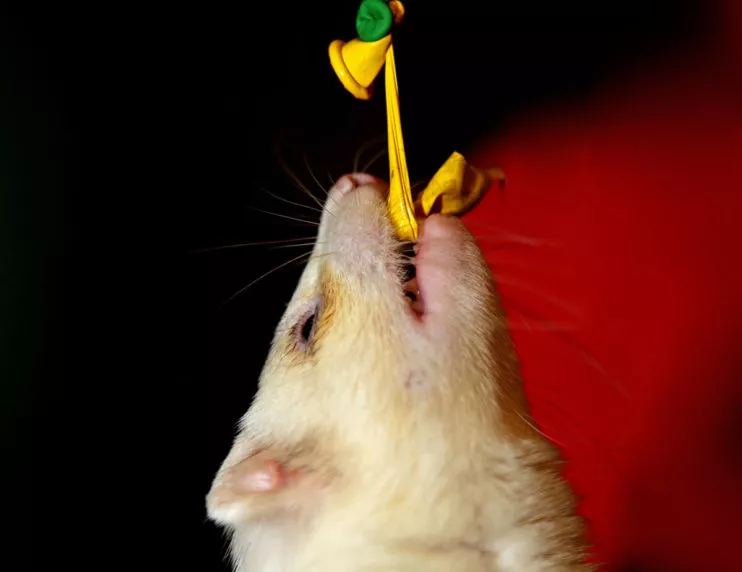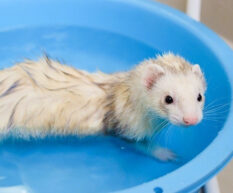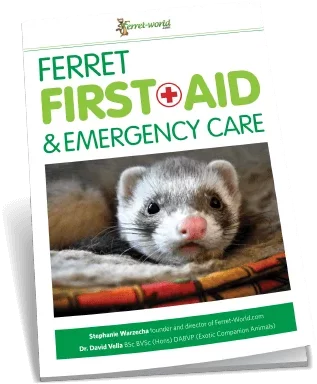Ferret News
How to Ferret-Proof Your Home and Yard
By Stephanie Warzecha

Ferrets are highly curious animals that will get into everything. Unfortunately, this can lead to accidents in which your ferret will need your help and possibly help from the veterinarian. Like with babies, you can’t expect your ferret to not blunder into dangerous situations when left to their own devices! However, there are ways to keep your ferret safe and ways to prevent these accidents from occurring.
How can you prevent accidents?
- Supervise playtime
- Ferret-proof your home and backyard
- Check for hazards and be aware of your ferret’s surroundings
- Only leave your ferrets with people you trust
Ferrets are curious by nature and will always try to get into things they’re not supposed to. No-go zones are particularly enticing and ferrets will normally persevere at getting into them so it’s wise to always keep an eye on your ferrets during playtime or any other time that they are out of their cage. Make sure you know where they are, because sometimes they end up curling up and going to sleep in the strangest and hardest to reach places. (There’s nothing more terrifying than thinking your ferret escaped because you can’t find their secret sleeping spot.) Knowing where your ferrets are or have gone to sleep is also important because it’s not that uncommon for a ferret to be injured or even killed when their owner sits on them because the ferret fell asleep in a couch, recliner, or even mattress.
Imagine if your ferrets got into serious trouble while you were not around. This could mean life or death, so if you’re stepping out of the room where they are playing and have no one else to look after them while you’re gone, then it’s best to put them back in their cage till you get back unless you are 100% certain that they cannot get into a dangerous situation.
Tip: Start thinking like a ferret. Ferrets are fantastic at problem solving. If they want to get to that open window (they don’t care much that you’re two floors up), then they will usually find a way to do so.
Ferrets tend to make everything their business and have to explore the entirety of their surroundings, whether you’re there or not. Naturally, this can be very dangerous. Ferrets have been known to get stuck behind fridges, wriggle inside ovens, fall asleep inside couches, or disappear in holes in the wall, floors, and drain pipes, never to return. They also like to visit the neighbours and try to make friends with the not-so-friendly dog, which usually ends badly for the ferret.
Before letting your ferret loose in the house or backyard, you may have to put up some boundaries or barricades so they cannot disappear under the house, into your neighbour’s backyard or into a room they’re not supposed to enter. Make sure cleaning chemicals are out of their reach, as well as anything else that could be a hazard. Some ferrets also like to explore the insides of toilet bowls, rubbish bins, and even like taking a plunge in pools.
So if you want to prevent your ferret drowning, eating something that it shouldn’t, poisoning itself, injuring itself, and you’re worrying yourself senseless, then take a look around your ferret’s play area and start thinking like a ferret. What would you find interesting? What would you try to eat? What could get you into trouble?
Common trouble areas in the house
- Holes where cabinets or baseboards meet the floor
- Around the oven
- Around the refrigerator
- Under the dishwasher
- In the cabinets, especially where there is plumbing
- Around windows
- Recliners
- Underneath couches
You will need to change a few habits when your ferrets are out. Check for ferrets before sitting anywhere. Walk carefully and slowly. Don’t leave hazardous materials within ferret reach. Check appliances for ferrets before using them. Don’t close or open doors quickly or hard.
Follow these guidelines when ferret-proofing:
- If your ferret’s face can fit into the hole, crack, tube, or opening, they will try to push their entire body in there. They may not be successful, but then they may get stuck.
- Remember ferrets can be excellent climbers.
- Remember ferrets are not as afraid of heights as they should be. If they can get on top of your tall bookcase, there’s a good chance they’ll try to hop off of it, not realizing how far down the floor is.
- Don’t leave windows open when ferrets are out, even if there’s a screen/fly trap.
- Get down on the floor and check under furniture, see if any baseboards are loose, and look closely for holes in the wall.
- Look inside all lower level cabinets. Your ferrets can get in cabinets unless you use good baby-proofing devices.
- Get cords off the floor or put them in plastic casing. Many ferrets like to chew on electrical cords and they can get electrocuted.
- Remember ferrets are tenacious. Some ferrets will literally spend hours trying to jump over a baby gate. All it takes is one success for your ferret to get in trouble.
Make sure your ferret can’t reach these things:
- Rubber or silicon. Some ferrets are obsessed with chewing rubbery materials, which can cause a blockage if accidentally swallowed. Watch out for earbud headphones, remote controls, rubber bands, computer mice, pens with rubber grips, some shoes, and even sex toys.
- Foam can also cause a blockage if accidentally ingested. Keep foam stress balls, mattress inserts or covers, mops, and toys stuffed with foam out of reach.
- Latex. A surprising number of ferrets like to steal and chew condoms!
- Similar to foam, some ferrets like to chew and maybe ingest sponge material, whether on a dishwashing sponge or a mop.
- Ferrets will sometimes chew on styrofoam, so keep packing materials, food packaging, and the like away from them.
- Bottle caps and wine corks. Ferrets like to collect small things like this. Bottle caps may cut them and they may ingest small bits of wine corks.
- Cotton swabs. Cotton swabs fall apart easily and can thus be easily accidentally swallowed.
- Unfinished fabric. Loose, unfinished fabric (particularly fabric that is fraying) can be accidentally ingested. It’s also dangerous for your ferret to get entangled in loose fabric.
- Carpet. Some ferrets like to chew carpet and most like to dig at it.
- Cleaning chemicals, poisons, paint, and anything you’d keep away from an infant. Like babies, ferrets will put anything in their mouth. Keep cleaning supplies, spray and other paint, household poisons, medications, and other hazardous materials out of reach, preferably high up.
- Ferrets can and will squeeze under, around, or even into your appliances, including your fridge, oven, and dishwasher. Keep them away from these appliances or ensure that they can’t get under, behind, or into them.
- Rocking chairs. It’s easy to rock over a ferret, so either keep rockers out of rooms the ferrets can go in or don’t use them when the ferrets are out.
- Recliners, convertible couches, and other fold-out furniture. Recliners and fold-out furniture are not designed to keep out ferrets, so they can crawl inside of the furniture and then be injured when the furniture is expanded or contracted. It’s best to not have this furniture in a room the ferret is ever in.
- Mattresses and box springs. Mattresses and box springs often have holes (or your ferret might make a hole), which is particularly dangerous if there are metal springs.
- Cosmetics and nail polish. Any beauty supplies can be dangerous if ingested.
- Cables, cords, and electric outlets. Some ferrets love to chew on cords and may be electrocuted. Use child-proof covers for your electrical outlets.
- Heating and cooling systems. These appliances or ducts can be very dangerous. Keep them out of reach.
- Doors and windows. Keep them closed!
- Human food or food scraps. Ferrets should not eat human food that is not part of a deliberate, healthy diet.
- Bodies of water, including pools. Ferrets will sometimes just jump into water and not be able to get out.
- Trash cans/bins. Many ferrets love trash bins and can get into all kinds of trash that is dangerous or poisonous.
- Ferrets are not as afraid of heights as they should be. Make sure they can’t climb their cage, curtains, furniture, windows, or anything else.
- Unfriendly animals.
- Young children. Never leave young children with any companion animal unsupervised.
- Floor vents and air ducts. Many ferrets will dig and maneuver until they can get into vents. Either block these completely or keep ferrets away from them.
- Many plants are poisonous to ferrets. Keep them away from plants and pick up any fallen leaves or petals before your ferrets come out.
- Ferrets will sometimes walk right into a fire and get burned before they realize it’s a bad idea. The standard wire mesh cover in front of a fireplace cannot keep out a ferret.
- Breakable items. Ferrets like to knock things over, so keep glass, porcelain, and other breakable items away from them.
- Vacuum cleaner hoses or dryer ducts. Ferrets can crawl in these and either become wedged or escape.
- Faulty, overused, damaged, or unsafe ferret toys.
- Children’s toys.
- Toilet paper rolls, paper towel rolls, or other slim cylinders.
- Stereo speakers and subwoofers. Ferrets will climb right inside these or injure themselves trying.
- Keep the lid down because ferrets will sometimes jump in and not be able to get out.
- Plastic bags. Supervise any play with plastic bags because ferrets love them, but they can get entangled and suffocate.
- Ferrets will absolutely climb into drains and other pipes.
- Luggage, backpacks, and purses. Don’t miss your flight because your ferret wanted to join you for the trip!
- Laundry. It’s better to do your laundry when your ferrets are in their cage, since they may get in your laundry and accidentally end up in washing machine or dryer.
- Open railings. Again, ferrets aren’t as afraid of heights as they should be.
- Fans, candles, and space heaters.




